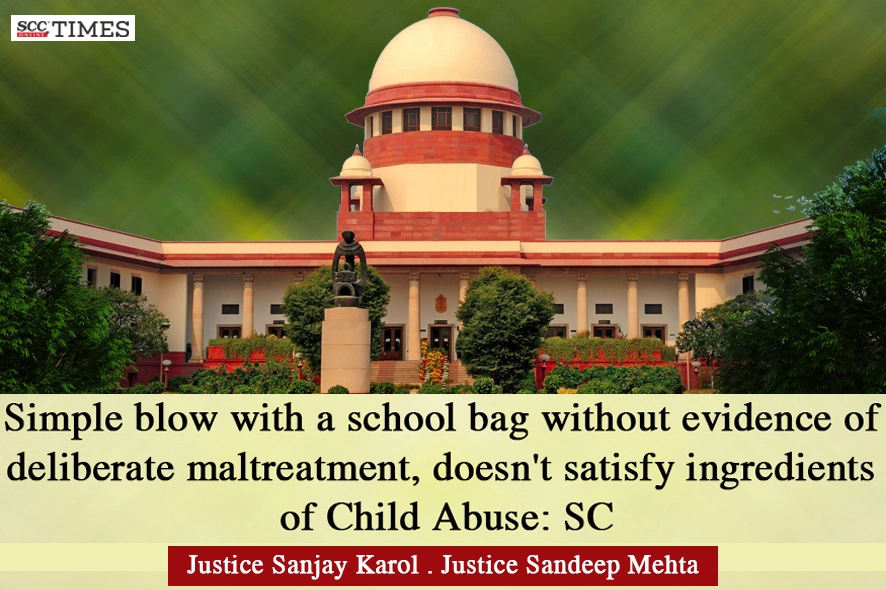Supreme Court: While considering a criminal appeal challenging the appellant’s (convict) conviction and sentence under Sections 323, 352 and 504 of the Penal Code, 1860 (IPC) and Section 8(2) of the Goa Children’s Act, 2003, for allegedly hitting a child with a school bag; the Division Bench of Sanjay Karol and Sandeep Mehta*, JJ., acquitted the convict for charges under Section 8 of the Goa Children’s Act and Section 504 IPC and confirmed his conviction under the Sections 323 and 352 of the IPC, deemed it fit to release the convict on probation.
The Court explained that offence of child abuse necessarily presupposes an intention to cause harm, cruelty, exploitation, or ill-treatment directed towards a child in a manner that exceeds a mere incidental or momentary act during a quarrel. A simple blow with a school bag without any evidence of deliberate or sustained maltreatment, does not satisfy the essential ingredients of child abuse.
Background:
It was stated by the counsels representing the convict that he casually hit a child with a school bag belonging to the convict’s own son.
The Children’s Court for the State of Goa at Panaji1, convicted and sentenced him under the afore-stated provisions of IPC and Goa Children’s Act. Being aggrieved with the verdict, the convict appealed before Bombay High Court. The High Court partly allowed the appeal by reducing the sentences awarded to the convict for the substantive offences.
Henceforth, the present appeal was filed before the Supreme Court.
Counsels for the convict contended that ex-facie, the offence under Section 8 (2) of the Goa Children’s Act, 2003 as the convict unintentionally and casually hit a child with a school bag and that this act is not “child abuse” as defined under Section 2(m) of the Goa Children’s Act. The Counsel further submitted that all the offences for which the convict has been charged, are punishable with imprisonment of less than 7 years and thus, the mandatory provisions of Probation of Offenders Act, 1958. Furthermore, it was contended that the convict is a poor labourer and is the only breadwinner in the family and this was the only offence in which he has ever been found involved and, therefore, it is a fit case warranting extension of the benefit of probation.
Per contra, the respondents contended that the High Court has already taken a liberal approach by substantially reducing the sentences imposed on the convict, and hence, no further leniency is warranted. Furthermore, extending the benefit of probation to the convict who has been found guilty of the offence punishable under the Goa Children’s Act by the Trial Court and the High Court, would send a wrong message to the society.
Court’s Assessment:
Perusing the facts, contentions and the impugned judgments, the Court noted that FIR was lodged for the incident after delay of 8 days.
Considering Section 8(2) of the Goa Children’s Act which provides punishment for “child abuse” as defined under Section 2(m), the Court pointed out that the offence of “child abuse” cannot be attracted to every trivial or isolated incident involving a child, but must necessarily co-relate with acts involving cruelty, exploitation, deliberate ill-treatment, or conduct intended to cause harm. The Court explained that the legislative intent behind Sections 2(m) and 8(2) is to protect children against serious forms of abuse and not to criminalise minor, incidental acts emanating during the course of simple quarrels.
Considering the allegations levelled by the injured child that the convict hit him with a school bag, the Court explained that even if the child’s version is accepted in entirety, it is not sufficient to hold the convict guilty for the offence of “child abuse” under Section 8(2).
Explaining that offence of child abuse presupposes an intention to harm a child in a manner that exceeds incidental or momentary act; hence, to invoke the penal consequences of such a serious offence in the absence of clear intention or conduct indicative of abuse, would amount to an unwarranted expansion of the provision. The Court stated that simply hitting a child with a school bag does not satisfy the ingredients of child abuse.
Therefore, with the afore-stated assessment, the Court set aside the conviction and sentence under Section 8 of Goa Children’s Act. The Court opined that both the Children’s Court and High Court committed grave error in rendering conviction under Section 504 IPC, as the said provision could only be invoked if the abusive or insulting language used by the accused against the injured child was intended to provoke breach of peace. Hence conviction under Section 504 was also set aside.
The Court noted that offence punishable under Section 323 IPC carries maximum punishment of simple imprisonment for 1 year whereas offence punishable under Section 352 IPC carries maximum punishment of imprisonment for 3 months. Thus, the mandatory provision of Section 4 of the Probation of Offenders Act, 1958 would apply to the convict. Therefore, the Court confirmed the conviction under Sections 323 and 352 IPC but directed that convict to be released on probation upon furnishing bonds before the jurisdictional Trial Court.
[Santosh Sahadev Khajnekar v. State of Goa, 2025 SCC OnLine SC 1828, decided on 26-8-2025]
*Judgment by Justice Sandeep Mehta
Advocates who appeared in this case:
For Appellant(s): Mr. Amrendra Kumar Mehta, AOR Ms. Pallavi Daem, Adv. Ms. Gunjan Kumari, Adv. Mr. Anubhav Bhardwaj, Adv.
For Respondent(s): Ms. Har Karam Jot Kaur, Adv. Ms. Shikha Sarin, AOR



